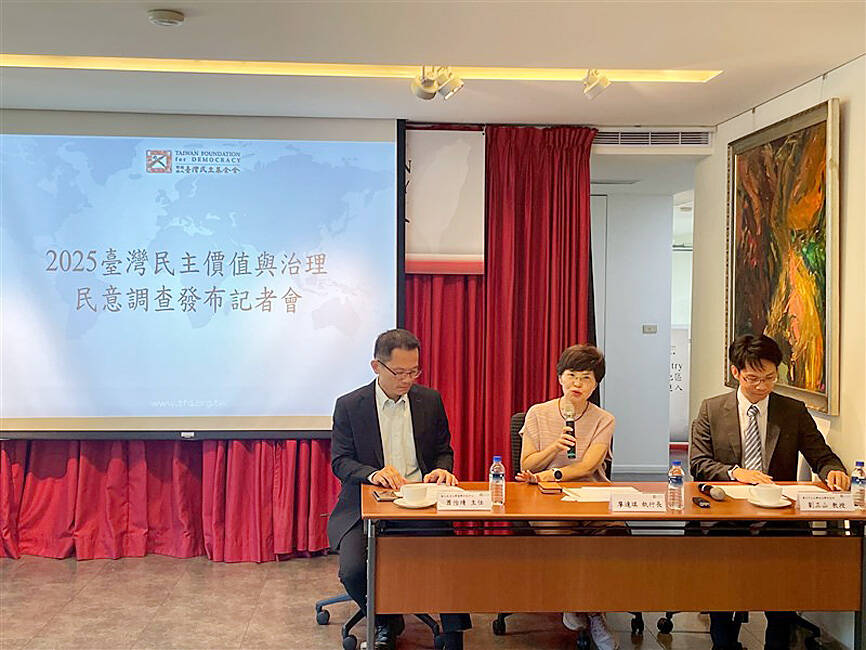A majority of Taiwanese prefer a legislature led by the opposition and support the existing recall system to remove elected representatives or officials, a poll released on Thursday by the Taiwan Foundation for Democracy (TFD) showed.
At a news conference in Taipei, Hsiao Yi-ching (蕭怡靖), head of the Election Study Center at National Chengchi University, said the results of the survey were in line with the recently concluded recall votes aimed at ousting 31 Chinese Nationalist Party (KMT) lawmakers.
The survey found that 50.5 percent of Taiwanese support using the recall system to remove elected representatives or officials they deem incompetent, while 38.4 percent view it as prone to being used as a “tool for political revenge.”

Photo: CNA
More than 60 percent of respondents agreed that democratic checks and balances work best when the president and the dominant group in the legislature come from different parties, with only 24.5 percent disagreeing.
“Taiwanese believe the executive branch should be kept in check by the legislature,” Hsiao said, adding that the outcome of the recent recall efforts, which ended in a clean sweep for the KMT, was therefore “not surprising.”
The unprecedented recall bid marked the culmination of a stand-off between the Democratic Progressive Party (DPP) government and the legislature, which has been controlled by the KMT and the smaller Taiwan People’s Party since President William Lai (賴清德) took office in May last year.
Franck Liu (劉正山), a political science professor at National Sun Yat-sen University, told the news conference that the poll findings reflect public expectations for the legislature to serve as a check on the executive.
However, Liu said that the findings also showed that the “partisan divide,” fueled by the months-long recall campaign, which the DPP supported, and the KMT’s countermeasures, had “further deepened societal fissures.”
To get out of this bind, political negotiations between the ruling and opposition parties are the only solution, Hsiao said, adding that democratic politics depends not only on public votes, but also on negotiations to build consensus among stakeholders.
Calling for more transparency from the government, Lu said that few ideological issues are currently on the table, with most debates focusing on public policies that can be discussed based on facts, such as US tariff measures and nuclear power.
Open discussion and thorough policy communication are important, especially for young voters, Liu added.
Regardless of the political split, TFD president Liao Da-chi (廖達琪) highlighted the “overwhelming” support for democracy in Taiwan.
Nearly 80 percent of 1,218 respondents in the survey agreed that, despite many problems, democracy remains the best system of government, Liao said.
Support for democracy among Taiwanese is both partisan and cross-generational, Liao said, citing the poll conducted from June 24 to 29, adding that this was particularly “precious” amid global democratic backsliding.
The TFD is a nonprofit organization funded by the Ministry of Foreign Affairs to promote democracy in the region and is typically headed by the legislative speaker.

Taiwan is to commence mass production of the Tien Kung (天弓, “Sky Bow”) III, IV and V missiles by the second quarter of this year if the legislature approves the government’s NT$1.25 trillion (US$39.78 billion) special defense budget, an official said yesterday. Commenting on condition of anonymity, a defense official with knowledge of the matter said that the advanced systems are expected to provide crucial capabilities against ballistic and cruise missiles for the proposed “T-Dome,” an advanced, multi-layered air defense network. The Tien Kung III is an air defense missile with a maximum interception altitude of 35km. The Tien Kung IV and V

The disruption of 941 flights in and out of Taiwan due to China’s large-scale military exercises was no accident, but rather the result of a “quasi-blockade” used to simulate creating the air and sea routes needed for an amphibious landing, a military expert said. The disruptions occurred on Tuesday and lasted about 10 hours as China conducted live-fire drills in the Taiwan Strait. The Civil Aviation Administration (CAA) said the exercises affected 857 international flights and 84 domestic flights, affecting more than 100,000 travelers. Su Tzu-yun (蘇紫雲), a research fellow at the government-sponsored Institute for National Defense and Security Research, said the air

Trips for more than 100,000 international and domestic air travelers could be disrupted as China launches a military exercise around Taiwan today, Taiwan’s Civil Aviation Administration (CAA) said yesterday. The exercise could affect nearly 900 flights scheduled to enter the Taipei Flight Information Region (FIR) during the exercise window, it added. A notice issued by the Chinese Civil Aviation Administration showed there would be seven temporary zones around the Taiwan Strait which would be used for live-fire exercises, lasting from 8am to 6pm today. All aircraft are prohibited from entering during exercise, it says. Taipei FIR has 14 international air routes and

Taiwan lacks effective and cost-efficient armaments to intercept rockets, making the planned “T-Dome” interception system necessary, two experts said on Tuesday. The concerns were raised after China’s military fired two waves of rockets during live-fire drills around Taiwan on Tuesday, part of two-day exercises code-named “Justice Mission 2025.” The first wave involved 17 rockets launched at 9am from Pingtan in China’s Fujian Province, according to Lieutenant General Hsieh Jih-sheng (謝日升) of the Office of the Deputy Chief of the General Staff for Intelligence at the Ministry of National Defense. Those rockets landed 70 nautical miles (129.6km) northeast of Keelung without flying over Taiwan,